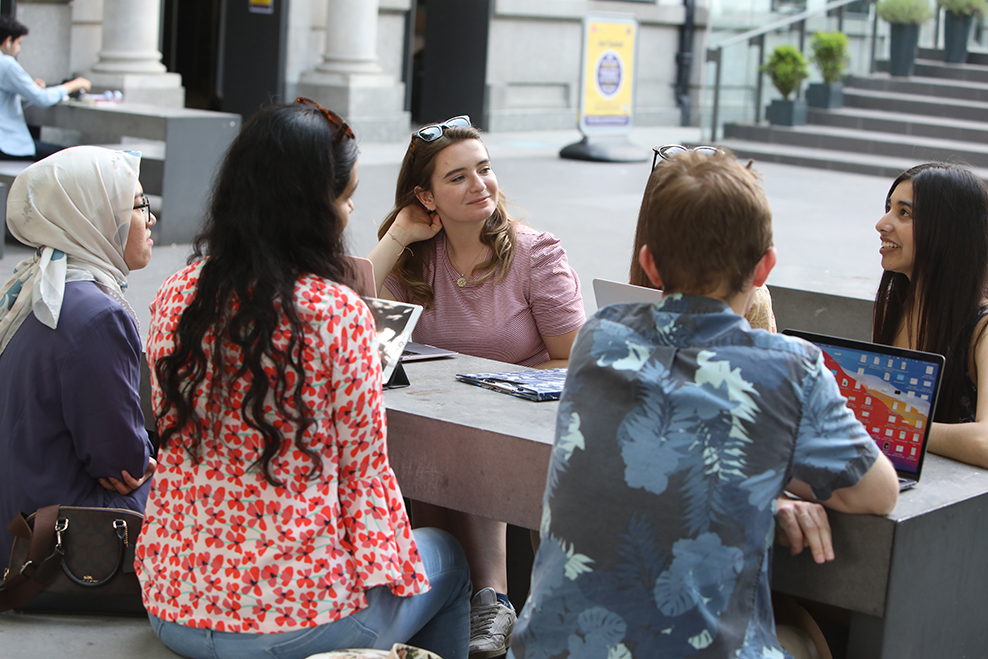Guest blog by Michael Tavares, Graduate Intern for the LSE Language Centre from September 2015-June 2016. Many LSE departments take on graduate interns every September – including us! Find out more and apply on CareerHub.
Why did you apply for the internship?
I am pursuing a career in government policy and consultancy. One of the many areas of public policy I am interested in is education. My mother is a Secondary School language teacher. When GCSE and A Level results are published every year, the decline in study of modern foreign language learning in British schools and leading universities is always a talking point. Languages are seen as difficult subjects, and in some cases, near impossible. This perception carries significant implications for Britain’s self-projection as a cosmopolitan and outward looking country. Whilst completing my BSc in Government & History at the LSE, I had an academic interest in the relationship between government policy and nation formation. I believed that the internship would provide me with the opportunity to investigate this relationship, by focusing on higher education language policy. The internship has certainly matched my expectations.
What skills have you developed?
I think the skills I have developed over the past nine months can be divided into five larger categories:
1. Adaptable Communication.
As an undergraduate, I always aimed to engage with a particular audience; an academic audience. LSE students are always looking to improve their academic writing style and this bodes well for those pursuing a research-orientated career. However, for those who aren’t, a degree of flexibility is required. Whilst interning, I have managed social media accounts targeted at a wide range of audiences. I have also written for various blogs, including LSECareers, ‘Learning Technology & Innovation’, ‘Impact of Social Sciences’ and ‘Researching Sociology@LSE’. The need to ensure that various audiences are catered for, whether it be students, academics, recruiters or members of the public, has been a challenge. It is nevertheless rewarding when a balance is struck and multiple audiences are engaged.
2. Co-ordination.
Student life is very independent. Independence is valued in the workplace and human initiative is an obvious virtue. However, this initiative and sense of responsibility must be measured against and balanced with the perspectives of colleagues. The Chinese Mandarin team have hosted several events during this academic year, none of which could be organised single handedly. In addition to organising the Chinese for Academic Purposes Conference (CAP), we also hosted Mr Jin Xu, Minister Counsellor of the Economic and Commercial Office of the Chinese Embassy in the UK. In order to successfully host both events, we pooled our ideas as a team, learning from past experiences.
3. Precision.
As a student of Government and History, I always aimed to provide a holistic account of political and social phenomena. My interest in studies of nationalism reflects this approach. I am interested in the interaction and dialogue between micro and macro social constructs. However, during the course of my internship, I have developed the ability to focus on and evaluate specific details and circumstances. For instance, when advising a colleague on the challenges of teaching languages in state funded secondary schools, I reviewed the context specific factors which may either enhance or prohibit language learning.
4. Relativity.
I have honed a skill I developed throughout my degree but particularly during my final year when I wrote my dissertation. Whilst trawling through various books and journal articles, I wanted to highlight perspectives and theories which were relevant to the focus of my dissertation. At times, it was difficult to find and relate various readings to the themes relevant to my dissertation. This forced me to review the aims of my dissertation question and reconsider the existing literature on the topic. Defining the aim of your work is difficult and arduous. What makes your research unique? Why is it original? This skill can only be developed with practise. I have further developed this skill by writing the 2016 Review of the LSE-Fudan Language Exchange Trip. Reviews can be mundane and repetitive documents; mere formalities. Before writing the Review, I focused on the key questions I was required to answer: Why would students read this document? How will I relate this document to the overriding global mission of the School?
5. Perspective.
Interning at the Language Centre has allowed me to view higher education from a different perspective. As a student, your main focus is your degree course. However, interning and being an employee of LSE has made me view this unique institution from a different perspective. Interning has made me evaluate the role of the university. Language learning can be done for purely intellectual reasons. Only through learning a country’s language can one understand a given culture. On the other hand, bi- or even multilingualism is identified as an asset on a CV, a skill which can give a graduate an edge in an increasingly competitive job market. Eight major investment banks clearly state that offering a second or third language is a definite advantage. LSE is a very career-orientated university and many, if not all, students apply to this university for precisely this reason. However, should university just be about becoming employable? Or should it be about gaining knowledge and interpreting this complex and globalising world? Amongst policy makers, academics and even students, the debate will go on. Nevertheless, having experienced LSE from contrasting perspectives, I feel that I have come closer to answering this question.
What has been the main challenge?
As an LSE student, you are only exposed to certain spaces and departments in the school. Aside from lecture theatres, seminar rooms, the Library and your home department, you are rarely required to experience or visit other departments. As an undergraduate, I never visited the Language Centre or enrolled in one of its courses. The Language Centre’s priority is teaching. It teaches over 3000 students a year and caters to the learning needs of a wide range of students. However, the centre also conducts research on educational and linguistic policy. I graduated from the Government Department, which is one of the most research intensive at the School. Adapting to the aims and culture of the department was an interesting challenge which I very much enjoyed.
What were the highlights?
For me, the obvious highlight has been visiting China with LSE colleagues. I had never visited China before and it was particularly interesting to visit the Tsinghua University campus in Beijing. Noting the similarities and differences between this leading Chinese university and LSE was fascinating. Whilst touring the campus, I felt that I could be on any university campus in the world. It is a truly international space; a good case study for those interested in the globalisation of higher education!
An additional highlight has been attending various events, including some at the Houses of Parliament, where I have been able to listen to and engage with policy experts. Finally, I have greatly benefited from the opportunity to work closely with an academic. Whilst an undergraduate, there are few opportunities to work closely with academics on a daily basis. However, working alongside an academic whose home discipline is different from mine has been particularly interesting. I have gained exposure to the shared and contrasting approaches and analytical tools which VARIOUS disciplines utilise to study global society.
What do you aim to do after your graduate internship?
I will be pursuing a Masters in Political Science at the University of Toronto from September 2016. I appreciate the fact that I have been able to evaluate the actual educational policy directives this year. Next year, I can apply learnt theory to the policy outcomes I have been exposed to this year! It will also be interesting to compare the working culture of world leading universities located in two of the most cosmopolitan, international and polyglot cities in the world. The demographics of Toronto make it one of the world’s most diverse cities, with about 50% of residents having been born in a country other than Canada. Studying at LSE and later interning at the Language Centre has certainly provided me with a cosmopolitan experience which few other universities can offer.
What advice would you give to future LSE Graduate Interns?
My first piece of advice would be to remember that as a former LSE student, you are a valuable source of information for colleagues in various divisions and departments. You can provide a unique insight into student experiences and advise colleagues accordingly. You have been there and done it.
Secondly, I would recommend identifying what skills you want to develop. You should do this at the start of your placement. When I started the internship, I knew I wanted to further develop my research and digital communication skills. My line manager has ensured that I have been given opportunities to develop these skills over the past nine months.
Finally, don’t be afraid to ask questions. You may think that after three years of studying here, you will know all there is to know about LSE. However, there will be aspects of LSE which you hadn’t previously noticed. The campus is bigger than you think!
With thanks to…
I would like to thank all colleagues at the Language Centre who have great to work with. In particular, I would like to thank Dr. Catherine Xiang and the Chinese Mandarin team. The team has had a great year with an increase in the number of students studying Mandarin. I wish them all the best for the future.





1 Comments